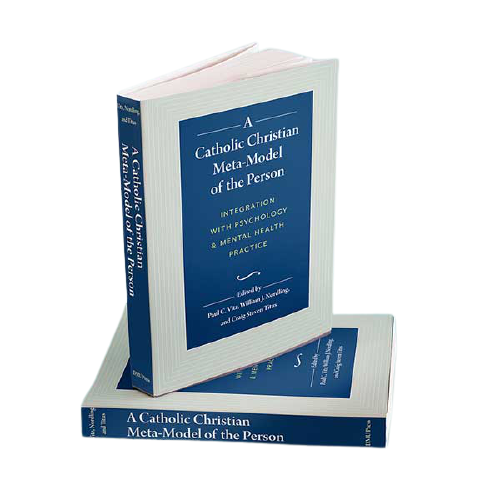A Foundational Concept
While elaborating a basic training approach for integrating a Catholic understanding of the human person, psychology, and mental health practice, the DMU faculty articulated a series of basic principles for a Meta-Model of the human person. This Catholic Christian Meta-Model of the Person (CCMMP) is the fruit of a longstanding and concerted effort of the University’s faculty, with input from its student body and outside collaborators as well.
The CCMMP blends the insights of three wisdom traditions—the psychological sciences, philosophy, and theology—to provide a framework for understanding the whole person. It provides an integrative mindset and approach to serve research, theory, and clinical practice for professionals of all levels in the mental health field and is at the heart of the DMU community.
Building a Framework
25 years in the making, the Catholic-Christian Meta Model of the Person grew from a recognized need to heal the spirit and the mind. Building this unique framework involves the entire Divine Mercy University community and outside collaborators.

All Faculty Integration Study Group
The Department of Integrative Studies is dedicated to the renewal of the Catholic Christian intellectual tradition and the integration of the theoretical and empirical bases of psychology and counseling with a Catholic-Christian view of the human person. In order to articulate such an integrated vision, the DMU faculty meets regularly in a research group called the “All Faculty Study Group.” Because these meetings involve not only psychologists and counselors–both clinicians and theoreticians–but also statisticians, philosophers, and theologians, they are inherently multidisciplinary.

Integrative Course Development Team
The members of the Department of Integrative Studies participate in the development and refinement of courses in the Institute for the Psychological Sciences’ M.S. in Psychology program and Psy.D. in Clinical Psychology program, as well as the School of Counseling’ M.S. in Counseling program.

Foundational Training in the Meta-Model for Faculty and Staff
The Department of Integrative Studies provides foundational and on-going training in the Catholic Christian Meta-Model of the Person for faculty and staff.

Faculty-Student Case Conceptualization Series
Annually, the Department holds a series of faculty-student case conceptualization sessions. Different formats and theoretical approaches are used in order to explore the benefit that the Meta-Model offer for understanding the client’s life narrative. A person-narrative formulation provides a rich understanding of the person’s callings, character, functioning, and diversity to assure a more complete clinical assessment and diagnosis, and treatment formulation.
The result
A Foundational Text
Published in 2020, A Catholic Christian Meta-Model of the Person is a foundational text, demonstrating a more systematic, integrative, and non-reductionist vision of the person, marriage, family, and society than is found in any of these three disciplines alone. The Meta-Model is a unifying framework for the integration of already-existing personality theories and therapeutic models. In addition, it enhances assessment, diagnosis, case conceptualization, and treatment planning by addressing eleven essential dimensions of the person needed in mental health practice aimed at healing and flourishing.
The book also explores how the Meta-Model framework can improve client care. Finally, it demonstrates how the Meta-Model assists mental health professionals to better understand how they can be faithful to their Christian identity as they serve all clients—Christians, persons from other faiths, and non-believers. In 2020, A Catholic Christian Meta-Model of the Person was also named as a Winner of the 4th Edition of the Expanded Reason Awards.

Continuing the Work
The integrative work of the DMU faculty has also given rise to ideas for: new research paradigms; integrated psychological assessment tools; new therapeutic modalities; and helpful ways of relating theology, philosophy, counseling, and psychology.
The Department of Integrative Studies has planned collaborative research initiatives, which will embody an integrated understanding of the human person, and which it is hoped will yield further evidence of the value of the Catholic-Christian Meta-Model of the Person in integrating psychology, counseling, and a Catholic understanding of the human person.
Divine Mercy University (DMU) is developing a peer-reviewed journal named the “Catholic Journal of Psychology and Mental Health Practice: A Multidisciplinary Journal of Catholic Christian Integration.” The Journal will be a scholarly journal that promotes a model of psychology, psychotherapy and counseling theory, and mental health practice grounded in an integral Catholic vision of the human person, family, and society.
As a specifically Catholic voice in print, it will contribute to the field and extend the mission of DMU and its schools of psychology and counseling to larger academic and professional communities. The Journal will also recognize and dialogue with the rich integrative scholarship of the broader Judeo-Christian tradition within the mental health field. A steering committee made up of faculty members from the IPS, the School of Counseling, and the Department of Integrative Studies (DIS) are collaborating in this important academic endeavor, under the coordination of Craig Steven Titus, S.T.D., Ph.D., Professor and Director of the DIS.
The DMU faculty has published theories and research in a growing number of published articles and chapters including:
Philosophical Virtues and Psychological Strengths: Building a Bridge
(2013) Manchester, NH: Sophia Institute Press
Cessario, R., Titus, C. S., & Vitz, P. C. (ed.)
Edification: A Journal of the Society of Christian Psychology (2009) dedicated to a Catholic Christian approach to psychology
